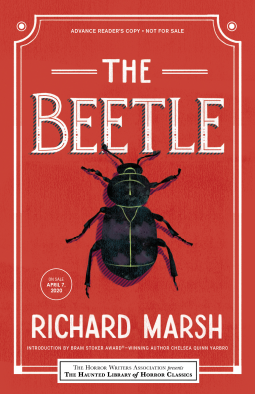Review: 'The Beetle' by Richard Marsh
Original Pub. Date: 1897
Pub. Date: 4/7/2020
Publisher: Poisoned Pen Press
A creature that seems to have crawled out of our worst nightmares...
Meet Paul Lessingham: an up-and-coming statesman, known for his unflappable calm, winning the respect of his peers and the admiration of the people with his powerful convictions and finely crafted speeches in Parliament. A man at the height of his powers, politically and personally, recently engaged to a beautiful young woman who adores him. A man on top of the world—reduced to a cowering, sniveling heap of abject terror at the utterance of two words: "The BEETLE!"
Set in London at the end of the nineteenth century, this blood-chilling tale is told from the viewpoints of four characters who have the distinct misfortune of stumbling into a diabolical scheme of revenge, with a scorned would-be lover—a strange, seemingly magical creature—at its core. Snubbed marriage proposals, secret engagements, deadly chemical experiments, and mysterious visitors all weave their hypnotic spell upon the reader, culminating in a desperate hunt for an abducted young woman whose life, it seems, is the price to be paid for her lover's indiscretion some twenty years prior.
Though published the same year as Bram Stoker's Dracula, Richard Marsh's The Beetle was far more popular in its day. This curated edition, based on the original 1897 publication by Skeffington and Sons, London, will horrify and delight the modern reader with its timeless tale of jealousy and its many hideous faces—as relevant today as it was over 100 years ago.
The Beetle is a typical example of Victorian literature which placed evil outside of Britain. A lot of Gothic books of the time did this, since it allowed them to imagine England as a pure and civilised place which is threatened by uncivilised danger from outside. Imperialism and racism are therefore an almost natural element of these books and that can be difficult to swallow for modern readers. In and of itself, however, that is exactly what makes it valuable reading! It is so important to realise how unconscious and conscious biases slip into our cultural productions, because it lays bare how many things seem natural. In The Heart of Darkness Joseph Conrad did so purposefully, showing the power of such thinking on a "normal" man who technically does know better. The Beetle has no such insight, it simply is a product of its culture and reflects what certain classes considered acceptable and obvious. It's a fascinating product of history because of that and does deserve to be read. I'm therefore glad it has recently been republished by different outlets, including Poisoned Pen Press.
The Beetle is told from four different perspectives. First comes Robert Hold, a man down on his luck. He enters a house he shouldn't, meets a horrifying creature that strips him and then... changes him. Second comes Sydney Atherton, a scientist in love with the wrong person. Through him we meet Marjorie Lindon and Paul Lessingham, the latter of whom is what I would call the real main character. He too encounters a horrifying creature. Third comes Marjorie, who is engaged to Paul. Concerned about her fiancé, she is the one who draws Sdney into figuring out what is going on and what has London, but especially Paul, so freaked out. Our last narrator is Augustus Champnell, who is asked for help by Paul. Is he the one who can figure out what is going on? The reason I have laid the plot out like this is because it demonstrates one of my favourite writing techniques, which is this neat folding in of narratives and narrators. In my opinion Mary Shelley does it best in Frankenstein, which is stunningly circular. But The Beetle is also fascinating in how it uses its different narrators to reveal new layers to the mystery and unearth new motivations.
The choice of structure discussed above really helps The Beetle be more fascinating than it perhaps, entirely, deserves. It's kind of like Pulp Fiction in that way, in the sense that both, if told in a normal, chronological, single narration would be a bit boring, but due to how it's structured becomes fascinating. In the end The Beetle is kind of pulp Gothic and utterly dramatic in a way that may seem a bit odd to readers used to 21st-century hyper-realism. It's a timepiece, clearly of its period, but it can also be real good fun. What sets this edition apart from the edition I read before is its extensive background material. Most classics come with an introduction, but this Poisoned Pen Press edition also has a reading list, discussion questions, and annotations. As I mentioned above, I do think The Beetle is the kind of text that needs some background information to explain its weirder aspects.
I give this novel...
3 Universes!
The Beetle, while no older than Dracula, looks its age. A lot of its tropes, ideas, and language are outdated. And yet, it's quite a fun read once you come to terms with that. It's beautifully over the top and the way its structured really elevates the material to a higher level.





Comments
Post a Comment